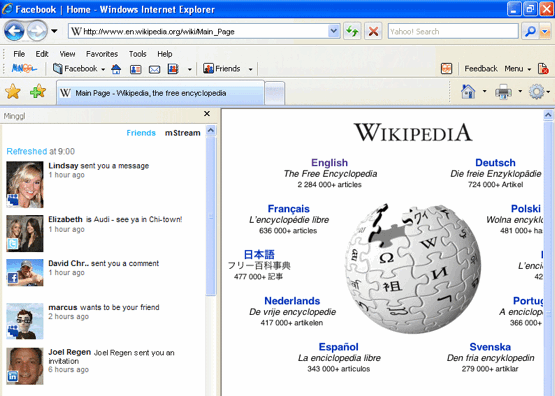 FriendFeed has garnered a lot of popularity within the tech community for its ability to aggregate information across a wide range of social networks, and layer a new conversation on top of that. Minggl is a new service attempting to do something similar, only via the browser rather than a web page.
FriendFeed has garnered a lot of popularity within the tech community for its ability to aggregate information across a wide range of social networks, and layer a new conversation on top of that. Minggl is a new service attempting to do something similar, only via the browser rather than a web page.
I sat down with Minggl founder Dewey Gaedcke and marketing director Brian Buser to go over the service and have them show me what it was all about.
Minggl exists as a browser plug-in for both Firefox and Internet Explorer. Thanks to this, it’s always running (as long as you want it to be) while your browser is open. Say you want to track what your contacts are doing. To do this on FriendFeed you would have to have window with the site open and switch back to check it constantly. With Minggl you simply browse the web as you normally would as notifications appear on your toolbar as your contacts update various services
But Minggl does a lot more than this. It also allows you to merge your friends together from different online networks and tag those friends so you can easily search for and find just who you are looking for. Say you have a group of friends you go hiking with. Simply tag anyone with “hiking” from across any network you have set up on Minggl, and they will show up in your sidebar upon a search.
The service also has a “status blaster” which allows you to update your status across all the sites that use such functionality, like Twitter, Facebook and MySpace. You can also do group messaging on networks from within Minggl. That feature is interesting because it points to one of the bigger differences that separates Minggl from other services, including FriendFeed.

Where FriendFeed uses sites’ APIs to pull in information from other networks, Minggl actually logs you in to the services in the background to pull information. Because of this, Gaedcke explains, Minggl has access to MySpace and LinkedIn and also the data on Facebook, such as the News Feed, that they won’t send out via API. You are constantly logged in to these sites, but you can still set the interval with which Minggl checks for updates.
Getting the information from these social networks was crucial for Minggl because it is “more friend-centric than news-centric,” Gaedcke notes.
Right now Minngl works with the Facebook, MySpace, LinkedIn and Twtter. The service also just launched integration with the popular social news voting site Digg to pull in the stories users submit and vote on.
The service doesn’t plan on stopping with those. Gaedcke and Buser said that it’s relatively easy to add more services to the toolbar, so we should expect the likes of YouTube, Flickr, Yelp and others soon. Also in the pipeline are some very cool and interesting features that they are hesitant to share at this time, but they gave me a sneak peak, and I can certainly vouch for them being potentially controversial — and popular, if executed right.
Minggl does have limited advertisements in the activity stream sidebar right now, but it is more focused on building up a loyal user base than monetizing right now
Another competitor for Minggl would have to be the social network-infused browser Flock. Flock might do things a little prettier, but it also requires that you download and use an entirely new browser. With Minggl, you can stick with either Firefox or Internet Explorer. Then there are newer services like MySocial 24×7 which takes FriendFeed’s services and ports them into your browser.
VentureBeat's mission is to be a digital town square for technical decision-makers to gain knowledge about transformative enterprise technology and transact. Learn More
